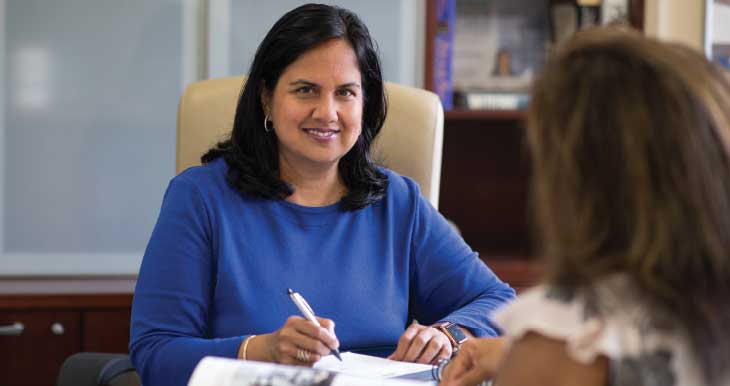
Sharmila Makhija, M.D., M.B.A., is a professor and the Chella and Moise Safra Chair in Obstetrics & Gynecology and Women’s Health at Einstein. She is a gynecologic oncologist and translational researcher who has published and lectured widely on cancer therapeutics. Dr. Makhija joined Montefiore-Einstein in 2015, after holding leadership positions at the University of Alabama at Birmingham (UAB), Emory University, and the University of Louisville.
My parents are from India and completed graduate school in the United States. My dad accepted a teaching position in Alabama, where I was born and raised.
My dad was a college chemistry professor, my mom a high school biology teacher. At dinnertime, we would talk about the day’s events and how we could make things better for others. I try to bring the same approach to department meetings. You can get a bit removed from day-to-day clinical practice as you move along the administrative path, so I feel it’s important to communicate and connect often with others.
I worked with Tata Hospital and its oncologists to improve cervical cancer care. Though it is a preventable disease and the early stages are treatable, barriers to accessing care in rural India often lead to diagnoses at incurable, late stages. Most women can’t afford to spend days traveling to a clinic, and a cancer diagnosis carries a social stigma for women that can lead to abandonment. For social survival, women often ignore both cancer symptoms and attending to basic healthcare needs. It was a valuable lesson on the importance of taking culture into account in healthcare delivery.
Though [cervical cancer] is a preventable disease and the early stages are treatable, barriers to accessing care in rural India often lead to diagnoses at incurable, late stages.
— Dr. Sharmila Makhija
Yes. Patients often can’t keep appointments for social and financial reasons. Having a diverse faculty helps bring awareness of cultural issues to the forefront of how we deliver care.
Our research team collaborated with Merck & Co. to enroll patients into
trials at UAB. We noted flaws in the trial design and helped Merck revise the trials to better enroll patients and address the vaccine’s clinical impact. As the top recruiter, I was the lead author. We also helped educate physicians and patients about the vaccine.
In 2008, when I was recruited as division chief of gynecologic oncology at Emory University, all budgets were cut by a third because of the financial crisis. While trying to convince the finance team that we needed more resources for clinical research programs, I realized we weren’t speaking the same language. I visited Emory’s Goizueta Business School and enrolled in the executive M.B.A. program to learn accounting and finance. But most important was what I learned about organizational behavior and the complexities of human behavior.
I knew about Einstein’s reputation for research, which has always been an important part of my career. As I learned more about Montefiore, I was drawn to its dedication to the social aspects of care. I haven’t seen this level of commitment at any other place I’ve worked.
Changing the culture in delivering care. It is easy to say, “We have always done it this way, and we are pretty good at it.” What matters is whether we’re making an impact. If not, we should be asking, “How can we do better?” We initiated monthly meetings with the leadership quality and safety team to address problems—not to assign blame, but rather to observe patterns and find solutions.
Changing culture is disruptive. We reminded ourselves of our mission to improve the care we deliver and recruited faculty who align with this mission. Our relationship with Every Mother Counts, a nonprofit focused on respectful maternal care, has broadened our knowledge of patients’ needs. We will always strive to improve—and this year, for the first time, our department was nationally ranked in U.S. News and World Report, a testament to our dedicated and caring faculty and associates.
We encourage our faculty to become more involved in research at Einstein. We have an established collaboration with colleagues in molecular pharmacology and, most recently, in genetics. I see a direct benefit in learning from one another to improve the health of our patients.
A neighbor asked me about a Bollywood actress for a movie she was producing. It’s based on the true and fascinating story of undercover female spies for the British during World War II. I created a production company, and the movie, Liberté: A Call to Spy, is my first project. It premiered at the Edinburgh International Film Festival in June 2019.
Placeholder text